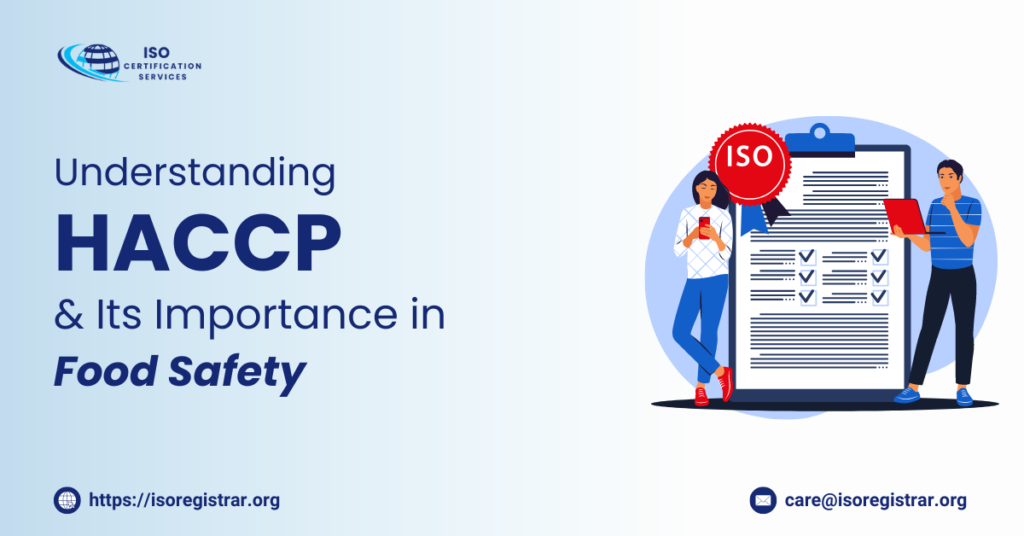Introduction
Hazard Analysis Critical Control Point (HACCP) is a systematic approach to food safety that addresses physical, chemical, and biological hazards as a means of prevention rather than end-product inspection. This method is crucial in ensuring that food products are safe for consumption. While HACCP is widely recognized and implemented globally, the term “NON IAF” indicates that the HACCP certification is not accredited by the International Accreditation Forum (IAF). This article explores the fundamentals of HACCP, its implementation, and the significance of NON IAF certification.
What is HACCP?
HACCP is a management system in which food safety is addressed through the analysis and control of biological, chemical, and physical hazards from raw material production, procurement, and handling, to manufacturing, distribution, and consumption of the finished product. It was developed in the 1960s by NASA and Pillsbury to ensure the safety of food for astronauts, and it has since become a global standard for food safety.
The HACCP system consists of seven principles:
- Conduct a hazard analysis.
- Determine the critical control points (CCPs).
- Establish critical limits.
- Establish monitoring procedures.
- Establish corrective actions.
- Establish verification procedures.
- Establish record-keeping and documentation procedures.
Understanding NON-IAF HACCP Certification
NON-IAF HACCP certification refers to HACCP certifications that are not accredited by the International Accreditation Forum. The IAF is an international organization that provides accreditation to certification bodies, ensuring that these bodies are competent to carry out specific tasks. NON IAF certifications may still be valuable, especially for smaller businesses or in regions where IAF-accredited services are not readily accessible. However, the credibility and international acceptance of NON-IAF certifications might differ from those accredited by the IAF.
Implementing HACCP in Food Safety Management
Implementing HACCP involves several steps to ensure that food products are safe for consumption. The process begins with assembling a HACCP team composed of individuals with diverse expertise in food safety and production processes. This team conducts a hazard analysis to identify potential hazards that could affect food safety. The next step is determining the critical control points (CCPs), which are stages in the production process where control can be applied to prevent or eliminate hazards.
Once the CCPs are identified, the team establishes critical limits, which are maximum or minimum values that must be controlled to prevent hazards. Monitoring procedures are then set up to ensure that CCPs are within the critical limits. If a deviation occurs, corrective actions must be implemented to bring the process back under control and ensure that no unsafe product reaches the consumer. Verification procedures are also established to confirm that the HACCP system is working effectively. Finally, detailed records and documentation are maintained to provide evidence of the HACCP system’s effectiveness and to facilitate traceability.
Benefits of HACCP
The primary benefit of HACCP is the prevention of foodborne illnesses, protecting consumers from health hazards associated with contaminated food. By identifying and controlling potential hazards, HACCP helps food businesses minimize risks and improve the overall quality and safety of their products.
HACCP also provides several business benefits. It helps companies comply with legal and regulatory requirements, thereby avoiding fines and legal issues. Implementing HACCP can enhance a company’s reputation, as it demonstrates a commitment to food safety. This can lead to increased consumer trust and potentially open up new market opportunities. Additionally, HACCP can lead to cost savings by reducing waste, improving process efficiency, and preventing costly recalls.
Challenges in Implementing HACCP
Despite its benefits, implementing HACCP can be challenging, particularly for small and medium-sized enterprises (SMEs). The process requires significant time, resources, and expertise. Developing a comprehensive hazard analysis and identifying CCPs can be complex, especially in diverse and dynamic food production environments.
Another challenge is maintaining the system over time. Continuous monitoring, regular verification, and updating of the HACCP plan as new hazards emerge require ongoing commitment and resources. For NON IAF-certified HACCP, gaining widespread acceptance and recognition can be difficult. Customers and regulatory bodies may prefer IAF-accredited certifications, which are widely recognized and trusted.
Note: Apply for ISO Certificate through the official Portal.
Conclusion
HACCP is a vital system for ensuring food safety, focusing on preventing hazards throughout the food production process. While NON IAF HACCP certification may not carry the same level of international recognition as IAF-accredited certifications, it still provides a structured approach to managing food safety risks. Implementing HACCP, whether through IAF-accredited or NON IAF certification, can significantly benefit food businesses by enhancing product safety, compliance, and consumer trust.
In an increasingly globalized food market, the importance of robust food safety management systems cannot be overstated. For businesses unable to access IAF-accredited services, NON-IAF HACCP certification offers a viable alternative to uphold food safety standards. Ultimately, the commitment to food safety and the diligent application of HACCP principles are what truly safeguard public health and maintain the integrity of the food supply chain.
